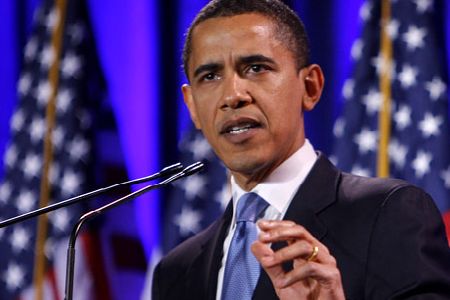Middle East: Obama Plans a Speech, But Little Prospect of Substance (Landler/Cooper)
 Wednesday, May 18, 2011 at 7:48 |
Wednesday, May 18, 2011 at 7:48 |  Scott Lucas in
Scott Lucas in  EA Middle East and Turkey,
EA Middle East and Turkey,  Middle East and Iran,
Middle East and Iran,  US Foreign Policy
US Foreign Policy  Mark Landler and Helene Cooper report for The New York Times:
Mark Landler and Helene Cooper report for The New York Times:
Six months after the Arab world erupted in a political firestorm, President Obama has been searching for ways to link the region’s historic transformation to the long-stymied peace negotiations between Israel and the Palestinians. It is far from clear how he can do that.
Mr. Obama will have a chance to reshape the debate on Thursday, when he delivers a major speech on the region at the State Department. The president plans to argue that the political upheaval raises the prospect for progress on all fronts, and will offer “some specific new ideas about U.S. policy toward the region”, the White House press secretary, Jay Carney, said Tuesday.
Officials said Mr. Obama was weighing whether to formally endorse Israel’s pre-1967 borders as the starting point for negotiations over a Palestinian state — a move that would be less a policy shift than a signal by the United States that it expected Israel to make concessions in pursuit of an agreement.
But several officials said the president did not plan to present an American blueprint for breaking the stalemate between the Israelis and Palestinians. In the absence of that, experts said, there is little he can do to draw the two sides closer, especially since the Arab upheaval has deepened the rift between them.
Mr. Obama has been grappling for a more coherent response to the violent crackdowns in Bahrain, Syria and Yemen and may use the opportunity to increase the pressure on Syria’s president, Bashar al-Assad. Secretary of State Hillary Rodham Clinton said stiffer sanctions against the Assad government could be imposed in the coming days.
Beyond the sanctions, Mr. Obama may personally criticize Mr. Assad in his speech, abandoning his somewhat restrained response to the Syrian government’s repression of protesters. Some administration officials said the American reticence stemmed in part from a hope, clearly unfulfilled, that the tumult could serve as a wedge to peel the Syrian government away from its alliance with Iran.
For Arab allies of the United States, Mr. Obama is offering encouragement to pursue reforms. On Tuesday, he welcomed King Abdullah II of Jordan to the White House and announced more than $400 million in American investments in Jordan, as well as aid in the form of 50,000 tons of wheat, which he said would help Jordanians and allow the government to speed up its overhaul of the economy.
Mr. Obama’s speech comes during a hectic week of Middle East diplomacy. In addition to King Abdullah, the president plans to meet with Prime Minister Benjamin Netanyahu of Israel on Friday. On Sunday, he is to address a major pro-Israel lobbying group, the American Israeli Public Affairs Committee. And later next week, Mr. Netanyahu plans to deliver his own speech, before a joint session of Congress.
But the whirl of activity comes against one of the most forbidding backdrops for the peace process in many years. Israeli security forces clashed with thousands of Palestinian protesters who marched into border areas on Sunday. And the Palestinian Fatah party recently signed a unity agreement with the Islamic militant group Hamas, which Mr. Netanyahu condemned as antithetical to a peace deal.
“I’ve never been more concerned about where this is headed than I am now,” said Robert Danin, a senior fellow at the Council on Foreign Relations who used to run the Jerusalem office of the group known as the Middle East quartet. “There seems to be increased momentum towards what could be a real explosion.”
Mr. Obama had considered laying out American parameters for a peace deal, several officials said — a move that Mrs. Clinton favored, but one that would have put him at odds with his national security adviser, Thomas E. Donilon, and his top Middle East adviser, Dennis Ross.
But the unity accord between Hamas and Fatah, the party of President Mahmoud Abbas of the Palestinian Authority, effectively killed the plans to try to push through an American proposal, one administration official said. “It’s hard to imagine how we do that when Hamas hasn’t agreed” to recognize Israel’s right to exist and to forswear violence against Israel, the official said.

Reader Comments